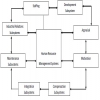Human Resources Management - HRM-Systems Perspective
Compensation - HRM-Systems Perspective
Posted On :
Wages are payments in return for the use of labour.
Compensation
Wages are payments in return for the use of labour.
Wages: Monetary compensation paid to the workers on hourly basis or piece rates.
Salaries: Monetary compensation paid to the staff like supervisors, executives etc., monthly.
Time wage rate: Payment made on basis of time such as hourly, daily, weekly and monthly.
Real wages: Real wages represent the goods and services which can be purchased from the money obtained from the wages.
Four types of incentives:
There are two sets of motivation
i. Positive Motivation – Reward, good pay, recognition, suggestive system, particular, supportive supervision, promotional avenues etc.,
All the aforesaid themes are to be integrated and one should not work in isolation.
Everything should go on smoothly and there should not be halting or interruption at any point.
The relations between employer and employee through their trade union is called industrial relations.
Wage Incentives
Wages are payments in return for the use of labour.
Wages: Monetary compensation paid to the workers on hourly basis or piece rates.
Salaries: Monetary compensation paid to the staff like supervisors, executives etc., monthly.
Time wage rate: Payment made on basis of time such as hourly, daily, weekly and monthly.
Real wages: Real wages represent the goods and services which can be purchased from the money obtained from the wages.
Wage payment plans
Two broad classifications are
1. Non-incentive wage plans like tune wage rate system.
2. Incentive wage plans like piece –rate system.
1. Non-incentive wage plans like tune wage rate system.
2. Incentive wage plans like piece –rate system.
Incentives
Four types of incentives:
1. Direct Incentives
2. Indirect Incentives
3. Financial Incentives
4. Semi-Financial Incentives
5. Non-Financial Incentives.
Motivation is defined as “an inducement which inspires a person to harness all his energy and capabilities and ply the same to the job willingly, in order to achieve the organizational objectives”.
3. Financial Incentives
4. Semi-Financial Incentives
5. Non-Financial Incentives.
Motivation
Motivation is defined as “an inducement which inspires a person to harness all his energy and capabilities and ply the same to the job willingly, in order to achieve the organizational objectives”.
i. Positive Motivation – Reward, good pay, recognition, suggestive system, particular, supportive supervision, promotional avenues etc.,
ii. Negative motivation – Reprimand, fines, demotion, lay off, discharge etc., (Not strictly motivation but detractors).
Integration
All the aforesaid themes are to be integrated and one should not work in isolation.
Maintenance
Everything should go on smoothly and there should not be halting or interruption at any point.
Industrial Relations:
The relations between employer and employee through their trade union is called industrial relations.
Good industrial relationship has the following advantages:
1. Reduces industrial disputes.
2. Improves morale of workers.
3. Develops positive attitude among employees.
4. Promotes better amenities, wages and welfare measures.
5. Improves production and productivity.
“Any dispute or difference between the employer and employees or between employees and workmen, or between workmen and workman, which is connected with employment or unemployment or the terms of employment or with the conditions of labour of any person”.
2. Improves morale of workers.
3. Develops positive attitude among employees.
4. Promotes better amenities, wages and welfare measures.
5. Improves production and productivity.
Industrial Disputes:
“Any dispute or difference between the employer and employees or between employees and workmen, or between workmen and workman, which is connected with employment or unemployment or the terms of employment or with the conditions of labour of any person”.
Tags : Human Resources Management - HRM-Systems Perspective
Last 30 days 311 views













